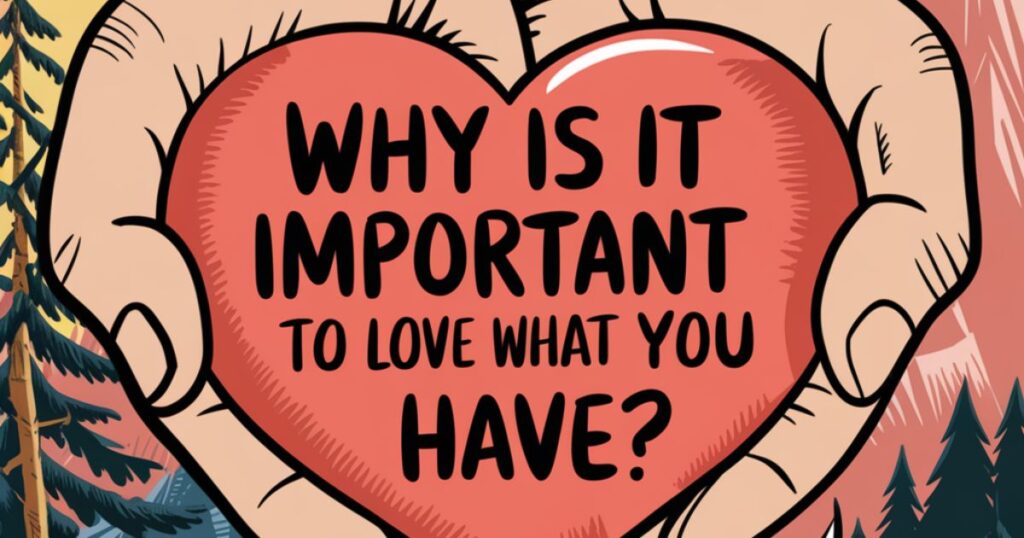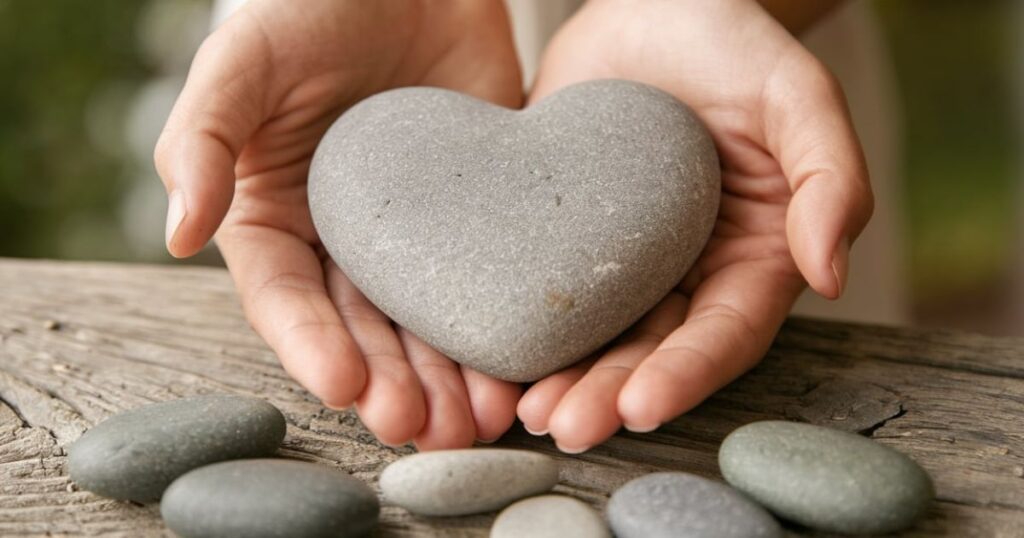In our fast-paced, consumer-driven society, it’s all too easy to get caught up in the endless pursuit of more. We’re constantly bombarded with messages telling us that happiness lies just around the corner – in the next purchase, the next achievement, or the next relationship.
But what if the key to true fulfillment and satisfaction was already within our grasp? This is the profound insight at the heart of Tymoff’s quote: “Love what you have before life teaches you to love.”
The Meaning Behind “Love What You Have Before Life Teaches You to Love – Tymoff”
Tymoff’s words cut through the noise of our modern world, offering a simple yet powerful message: appreciate what you have now, before circumstances force you to realize its value. It’s a call to cultivate gratitude and mindfulness in the present moment, rather than constantly chasing after future desires or dwelling on past regrets.
This quote isn’t just feel-good fluff – it’s a challenge to our entire approach to life and happiness. In a world that often glorifies the “grass is greener” mentality, Tymoff is urging us to water our own lawn. It’s about recognizing the abundance that already exists in our lives, rather than focusing on what we lack.
The urgency in Tymoff’s message is clear. Life is unpredictable, and the things we take for granted today might not be there tomorrow. By loving what we have now, we’re not only enhancing our present happiness but also protecting ourselves from future regret.
Why Is It Important to Love What You Have?

In our consumer-driven society, it’s easy to fall into the trap of constant dissatisfaction. We’re bombarded with ads and social media posts that subtly (or not so subtly) tell us we’re not enough – that we need more stuff, more experiences, more success to be truly happy. But this mindset is a recipe for perpetual unhappiness.
Shifting from a scarcity mindset to an abundance mindset can be transformative. When we focus on loving what we have, we train our brains to notice the good things in our lives. This doesn’t mean ignoring problems or settling for less than we deserve. Instead, it’s about finding balance – appreciating our current blessings while still working towards our goals.
The long-term benefits of present-moment appreciation are substantial:
- Increased resilience: When we’re grateful for what we have, we’re better equipped to handle life’s inevitable ups and downs.
- Improved mental health: Gratitude has been linked to reduced symptoms of depression and anxiety.
- Enhanced relationships: Appreciating the people in our lives strengthens our connections and fosters deeper bonds.
- Greater overall life satisfaction: People who regularly practice gratitude report higher levels of happiness and well-being.
Gratitude Enhances Happiness
The link between gratitude and happiness isn’t just anecdotal – it’s backed by science. Numerous studies have shown that practicing gratitude can significantly boost our emotional well-being and overall life satisfaction.
For example, a study published in the Journal of Personality and Social Psychology found that participants who kept a weekly gratitude journal reported feeling more optimistic and better about their lives compared to those who recorded hassles or neutral life events.
Another study in the Journal of Happiness Studies revealed that gratitude was a strong predictor of life satisfaction and psychological well-being.
But how does gratitude work its magic on our brains? Neuroscientific research has shown that gratitude activates areas of the brain associated with dopamine and serotonin production – the “feel-good” neurotransmitters. This means that the more we practice gratitude, the more we’re literally rewiring our brains for happiness.
“Gratitude can transform common days into thanksgivings, turn routine jobs into joy, and change ordinary opportunities into blessings.” – William Arthur Ward
Avoiding Regret
We’ve all experienced that painful realization of “you don’t know what you’ve got till it’s gone.” It’s a universal human experience, but one that Tymoff’s wisdom can help us minimize.
By actively appreciating what we have in the present, we’re creating a buffer against future regrets. Think about it – how often have you looked back on a relationship, a job, or even a simple everyday pleasure and wished you’d valued it more at the time?
Strategies for recognizing value before loss:
- Regular reflection: Take time each day or week to consciously acknowledge the good things in your life.
- Imagine loss: While it might sound morbid, occasionally imagining life without certain people or things can heighten our appreciation for them.
- Express gratitude: Don’t just feel grateful – express it. Tell people how much they mean to you.
- Document the present: Keep a journal, take photos, or create mementos that capture the beauty of your current life.
Building Stronger Relationships
Appreciation plays a crucial role in deepening our connections with others. When we take our relationships for granted, we risk eroding the very foundations that make them special. On the flip side, expressing gratitude and love for the people in our lives can strengthen bonds and foster a positive cycle of appreciation.
Dr. John Gottman, renowned relationship expert, found that couples who regularly express appreciation for each other are more likely to stay together and report higher relationship satisfaction. This principle extends beyond romantic relationships to friendships, family ties, and even professional connections.
Techniques for expressing gratitude to loved ones:
- Write heartfelt letters or notes
- Perform acts of service
- Give genuine compliments
- Create personalized gifts that show thoughtfulness
- Simply say “thank you” more often
Life’s Lessons: How It Teaches Us to Love

Life has a way of being a strict teacher, doesn’t it? Sometimes, the most potent lessons come from experiences we’d rather avoid. This is the crux of Tymoff’s warning – learn to love what you have willingly, or life might force you to learn through loss.
Loss
Personal stories of loss teaching appreciation abound. Consider Sarah, who never thought much about her ability to walk until a car accident left her temporarily paralyzed. During her recovery, she gained a profound appreciation for the simple act of taking a step – something she had previously taken for granted.
Loss has a unique way of shifting our perspective. It strips away the non-essential and brings into sharp focus what truly matters. The challenge is to honor what’s lost by appreciating what remains. This doesn’t mean minimizing grief or glossing over pain. Instead, it’s about allowing loss to open our eyes to the preciousness of what we still have.
Change
Change is the only constant in life, as the saying goes. Yet, we often resist it, clinging to the familiar even when it no longer serves us. Tymoff’s wisdom encourages us to embrace change while still cherishing the present.
Change can reveal the value of what we had in unexpected ways. Maybe it’s moving to a new city and suddenly missing those weekly dinners with your parents. Or switching jobs and realizing how much you appreciated your old colleagues.
The key is to find balance – to embrace the possibilities that change brings while still loving and appreciating our current circumstances. This mindset allows us to move through life with grace and gratitude, rather than constantly mourning what’s past or anxiously awaiting the future.
Also Read: Timothy Shalloway: The Rising Star Everyone’s Talking About
Reflection and Growth
Hindsight, as they say, is 20/20. Reflection allows us to recognize missed opportunities for appreciation and learn from them. But rather than getting stuck in regret, we can use these insights to cultivate present gratitude.
Growth comes from turning regret into action. If you realize you didn’t appreciate a past relationship enough, use that knowledge to be more present and expressive in your current relationships. If you regret not enjoying your college years more, let that inspire you to make the most of your current phase of life.
How to Practice Loving What You Have

Transitioning from understanding Tymoff’s wisdom to actually living it can be challenging. Our brains are wired to focus on threats and deficiencies – it’s an evolutionary trait that helped our ancestors survive. But in our modern world, this tendency can lead to chronic dissatisfaction.
The good news is that we can rewire our brains for appreciation and contentment. Here are some practical strategies:
Daily Gratitude Practice
The science behind gratitude journaling is compelling. A study by Dr. Robert Emmons, a leading gratitude researcher, found that people who kept gratitude journals for just three weeks reported better sleep, more optimism, and greater connection to others.
Creative ways to incorporate gratitude into daily routines:
- Gratitude jar: Write down one thing you’re grateful for each day and put it in a jar. Read them all at the end of the year.
- Gratitude walk: Take a short walk each day, focusing on the things you’re grateful for in your environment.
- Gratitude alarm: Set a daily alarm as a reminder to pause and think of three things you’re grateful for.
- Gratitude partner: Team up with a friend or family member to share daily gratitudes.
Mindfulness
Mindfulness is the practice of being fully present in the moment, without judgment. It’s closely connected to Tymoff’s message of loving what you have, as it trains us to engage deeply with our current experiences rather than always looking ahead or behind.
Simple mindfulness exercises for beginners:
- Mindful breathing: Take five minutes to focus solely on your breath.
- Body scan: Slowly move your attention through your body, noticing sensations without trying to change them.
- Mindful eating: Choose one meal a day to eat without distractions, focusing on the flavors, textures, and sensations.
Appreciate Relationships
Showing appreciation has a ripple effect. When we express gratitude to others, it not only strengthens our bond with them but also increases their likelihood of expressing gratitude in turn.
Unique ways to express gratitude to others:
- Create a video montage of memories and reasons you’re grateful for someone
- Write a song or poem expressing your appreciation
- Plan a “gratitude day” where you shower someone with appreciation
- Start a tradition of sharing appreciations at family dinners or team meetings
Let Go of Comparison
In the digital age, comparison has become almost unavoidable. Social media presents us with carefully curated highlight reels of others’ lives, making it easy to feel like we’re falling short.
Strategies for breaking the comparison habit:
- Curate your social media: Unfollow accounts that consistently make you feel inadequate.
- Practice self-compassion: When you catch yourself comparing, respond with kindness to yourself.
- Focus on your personal growth: Compare yourself to who you were yesterday, not to who someone else is today.
- Practice mudita: This Buddhist concept refers to taking joy in others’ happiness and success, rather than feeling threatened by it.
Conclusion
Tymoff’s wisdom – “Love what you have before life teaches you to love” – is more relevant than ever in our fast-paced, future-focused world. By cultivating gratitude, practicing mindfulness, appreciating our relationships, and letting go of comparison, we can learn to love what we have right now.
This doesn’t mean settling for less or giving up on growth. Instead, it’s about finding the delicate balance between contentment and ambition, between appreciating the present and working towards the future.
As we navigate life’s inevitable changes and losses, let Tymoff’s words be a guide. By loving what we have today, we not only enhance our current happiness but also protect ourselves from future regrets. We build stronger relationships, develop resilience, and cultivate a deep sense of fulfillment that isn’t dependent on external circumstances.
So, take a moment right now. Look around you. What do you have that you can love and appreciate? Don’t wait for life to teach you its harsh lessons. Start loving what you have today, and watch as your world transforms.
Explore the latest news and insights from Vibrant’s and beyond at Vibrantsvista.com

Indu Pushpa is the admin of Vibrantsvista.com, offering insights on general topics with a passion for providing valuable, diverse, and engaging content to a broad audience.
